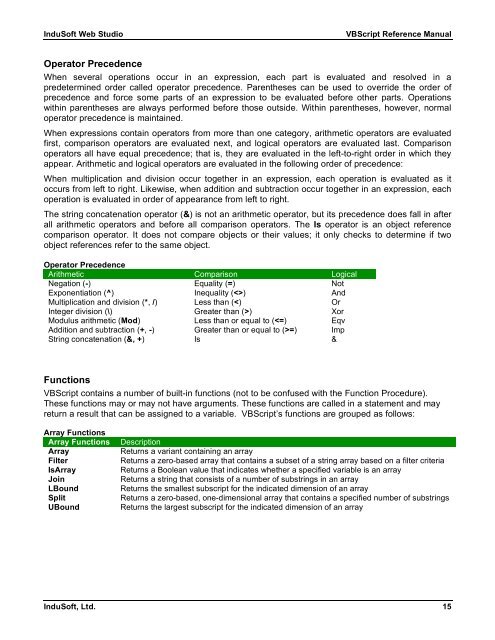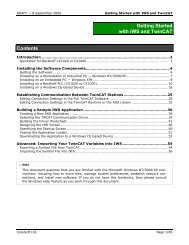VBScript Reference Manual for InduSoft Web Studio
VBScript Reference Manual for InduSoft Web Studio
VBScript Reference Manual for InduSoft Web Studio
Create successful ePaper yourself
Turn your PDF publications into a flip-book with our unique Google optimized e-Paper software.
<strong>InduSoft</strong> <strong>Web</strong> <strong>Studio</strong> <strong>VBScript</strong> <strong>Reference</strong> <strong>Manual</strong><br />
Operator Precedence<br />
When several operations occur in an expression, each part is evaluated and resolved in a<br />
predetermined order called operator precedence. Parentheses can be used to override the order of<br />
precedence and <strong>for</strong>ce some parts of an expression to be evaluated be<strong>for</strong>e other parts. Operations<br />
within parentheses are always per<strong>for</strong>med be<strong>for</strong>e those outside. Within parentheses, however, normal<br />
operator precedence is maintained.<br />
When expressions contain operators from more than one category, arithmetic operators are evaluated<br />
first, comparison operators are evaluated next, and logical operators are evaluated last. Comparison<br />
operators all have equal precedence; that is, they are evaluated in the left-to-right order in which they<br />
appear. Arithmetic and logical operators are evaluated in the following order of precedence:<br />
When multiplication and division occur together in an expression, each operation is evaluated as it<br />
occurs from left to right. Likewise, when addition and subtraction occur together in an expression, each<br />
operation is evaluated in order of appearance from left to right.<br />
The string concatenation operator (&) is not an arithmetic operator, but its precedence does fall in after<br />
all arithmetic operators and be<strong>for</strong>e all comparison operators. The Is operator is an object reference<br />
comparison operator. It does not compare objects or their values; it only checks to determine if two<br />
object references refer to the same object.<br />
Operator Precedence<br />
Arithmetic Comparison Logical<br />
Negation (-) Equality (=) Not<br />
Exponentiation (^) Inequality () And<br />
Multiplication and division (*, /) Less than () Xor<br />
Modulus arithmetic (Mod) Less than or equal to (=) Imp<br />
String concatenation (&, +) Is &<br />
Functions<br />
<strong>VBScript</strong> contains a number of built-in functions (not to be confused with the Function Procedure).<br />
These functions may or may not have arguments. These functions are called in a statement and may<br />
return a result that can be assigned to a variable. <strong>VBScript</strong>’s functions are grouped as follows:<br />
Array Functions<br />
Array Functions Description<br />
Array Returns a variant containing an array<br />
Filter Returns a zero-based array that contains a subset of a string array based on a filter criteria<br />
IsArray Returns a Boolean value that indicates whether a specified variable is an array<br />
Join Returns a string that consists of a number of substrings in an array<br />
LBound Returns the smallest subscript <strong>for</strong> the indicated dimension of an array<br />
Split Returns a zero-based, one-dimensional array that contains a specified number of substrings<br />
UBound Returns the largest subscript <strong>for</strong> the indicated dimension of an array<br />
<strong>InduSoft</strong>, Ltd. 15



